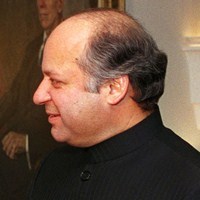When Pakistan’s newly elected prime minister, Nawaz Sharif, appointed his Cabinet, he decided to keep two major portfolios for himself: foreign affairs and defense. The move was widely interpreted as emanating from the civil-military imbalance that defines decision-making on foreign and security policy in Pakistan. Senior members of Sharif’s Pakistan Muslim League-Nawaz (PML-N) explained that Sharif wanted to prevent the kind of “misunderstandings” between the prime minister and the military on matters of foreign affairs that had occurred in the past, and added, “We've been dominated by the military for decades. And they still think they are superior to the elected politicians. . . . The politicians have to throw their weight around as well."
Today’s Pakistan features not just a tussle for power between the civilian government and the military, but also an assertive judiciary. These realities put Sharif, who previously served two terms as prime minister in the 1990s, in a tough spot, as in the past he has engaged in power struggles with both institutions. Now, in addition to solving major policy problems, one of Sharif’s major challenges will be navigating his way around a powerful military and activist judiciary.
Sharif’s strained relationship with the Pakistani army is ironic, given that he began his political career as a protege of military dictator Gen. Mohammed Zia ul-Haq, under whose rule Sharif became chief minister of Punjab and cultivated strong alliances within the military. During his second term as prime minister, however, Sharif had major showdowns with the military command. In 1998, he forced then-Army Chief Gen. Jehangir Karamat to retire when Karamat criticized Sharif’s policies as being responsible for Pakistan’s economic and security chaos. Then when the 1999 Kargil operation, in which Pakistani soldiers infiltrated Indian-controlled Kashmir, failed, Sharif’s government blamed the military. Moreover, fearing a coup d’etat, Sharif tried to dismiss Army Chief Gen. Pervez Musharraf. The episode resulted, however, in Sharif’s ouster and exile at Musharraf’s hands.

